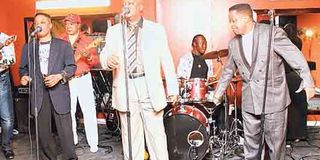Veteran King kiki not bowing out soon

What you need to know:
The frailties of most of today’s rumba bands could well lend credence to this argument, many no longer attract the huge audiences they once did in the 90s and some are long extinct.
Dar es Salaam. There is a belief that Bongo Flava has taken over the proceedings in the music industry, leaving very little space for old timers who still have taste for rumba.
The frailties of most of today’s rumba bands could well lend credence to this argument, many no longer attract the huge audiences they once did in the 90s and some are long extinct.
No wonder they enjoy very little air play on radio and TV stations which are the main avenues of promoting content.
In the middle of this noisy debate there is one man who just won’t bow out of the game as yet with a following that matches the best the current crop of artistes.
Having been silent for some time Kikumbi Mwanza wa Mpango aka King Kiki is back performing with his band Orchestra La Capital aka ‘Wazee Sugu’ at Escape One, 40 years since he arrived in the country.
Now in his twilight, King Kiki continues to bear the evergreen tag as he plays one of his famous hits Kitamba Cheupe much to the delight of the most middle age audience.
At 70 he still has the energy and the vocal prowess to sustain over two hours of nonstop performance, a feature that has deserted many of today’s crop of artistes. Maybe it is this plus his ‘Chungulia’ style that continues to draw even youthful audiences at his performances wherever he goes.
He bears the mark a true icon of rumba who just won’t be pushed aside any time soon for he has what it takes to last a little longer than many can anticipate.
His has been a long journey that dates back into the early 70s when he first arrived in Tanzania from the Democratic Republic of Congo (Zaire) with a band called Fouvette Jazz Band, on the invitation of Fred Ndala Kasheba.
His early influences started with the visit of Mama Africa aka Miriam Makeba to the then Zaire now DRC in 1952 when his brother took him along to the show.
“I have been blessed to travel widely to perform but I am yet to see a performance of that level because Makeba just knew how to do her thing and that is why he left a lasting impression on everyone who attended the show,” he once told Mwananchi in an interview.
This by default was to mark the beginning of his journey into music, one that would take him to several countries before finally landing in Tanzania which ended up being his home.
King Kiki says his journey into music started quite early in 1962 with Fauvette Band but it was popular songs such as ‘Jacqueline’ and ‘Kamarade ya Nzela’ that kick started his journey to Tanzania
He was an instant hit with the rumba audience in the country; he was to return later in 1977 to join Maquis du Zaire which was under the leadership of the late Chinyama Chianza.
Maquis a band that was formed in 1966 as Orchestre Super Gabby, a group made up of some young Zairean musicians. In 1972, the band changed its name to Orchestre Maquis du Zaire and moved to Tanzania, where they became quite popular and so decided to stay. Today, with a membership of over 40 musicians, they are still one of the most popular bands in Tanzania.
Through one of the most popular styles of the time, ‘Kamanyola Bila Jasho’ King Kiki dominated with hits such as ‘Nimepigwa Ngwala’ and ‘Kyembe’.
Just like most rumba artistes of the time, two years later he left Maquis Du Zaire after he was approached by a certain Hugo Kisima who requested him to lead Orchestra Safari Sounds with another style that was known as ‘Masantula Ngoma ya Mpwita’ which later evolved to become ‘Duku Duku’.
Of the songs that King Kiki remembers during that era is Msafiri a song that many say symbolized his nomadic music life as he was to leave Safari Sounds to form Double O a couple of years later.
This band would also get disbanded later due to management issues leaving King Kiki with no choice but to settle for guest artiste performances.
At these guest appearances he would team up with Emmanuel Mpangala and Nguza Viking to form a lethal musical partnership.
Just like in the 1980s King Kiki continued to move from one band to another, this time around after leaving Nguza Viking’s band in 1994 he joined forces with Ndala Kasheba to form Zaita Musica and it was here that the Kitambaa Cheupe was born.
It is a style that he has continued to use with his La Capital Band aka Afrika Bara Gumu, a style that he says symbolizes peace and love.
King Kiki, a naturalised Tanzanian citizen since 1997 believes La Capital Wazee Sugu which he formed in 2003 is probably the best band in the city today and this could as well be the last band for him since he left Katanga.
Though most of his peers who came with him to Tanzania in the 70s are no longer active or met their destiny, King Kiki remains an isolated figure who is ready bear the torch.
It is not clear how long this rumba maestro can continue thrilling audiences but by gauging from his recent activity he is far from being written off, for has the energy and the will to keep going.




